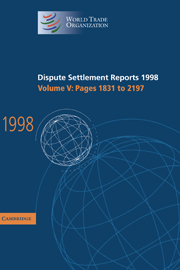Book contents
- Frontmatter
- Contents
- European Communities - Measures Concerning Meat and Meat Products (Hormones) (WT/DS26/15, WT/DS48/13): Award of the Arbitrator under Article 21.3(c) of the DSU
- European Communities - Customs Classification of Certain Computer Equipment (WT/DS62/AB/R, WT/DS67/AB/R, WT/DS68/AB/R) (WT/DS62/R, WT/DS67/R, WT/DS68/R): Report of the Appellate Body
- European Communities - Customs Classification of Certain Computer Equipment (WT/DS62/AB/R, WT/DS67/AB/R, WT/DS68/AB/R) (WT/DS62/R, WT/DS67/R, WT/DS68/R): Report of the Panel
- European Communities - Measures Affecting the Importation of Certain Poultry Products (WT/DS69/AB/R), (WT/DS69/R): Report of the Appellate Body
- European Communities - Measures Affecting the Importation of Certain Poultry Products (WT/DS69/AB/R), (WT/DS69/R): Report of the Panel
European Communities - Measures Affecting the Importation of Certain Poultry Products (WT/DS69/AB/R), (WT/DS69/R): Report of the Appellate Body
Published online by Cambridge University Press: 22 December 2017
- Frontmatter
- Contents
- European Communities - Measures Concerning Meat and Meat Products (Hormones) (WT/DS26/15, WT/DS48/13): Award of the Arbitrator under Article 21.3(c) of the DSU
- European Communities - Customs Classification of Certain Computer Equipment (WT/DS62/AB/R, WT/DS67/AB/R, WT/DS68/AB/R) (WT/DS62/R, WT/DS67/R, WT/DS68/R): Report of the Appellate Body
- European Communities - Customs Classification of Certain Computer Equipment (WT/DS62/AB/R, WT/DS67/AB/R, WT/DS68/AB/R) (WT/DS62/R, WT/DS67/R, WT/DS68/R): Report of the Panel
- European Communities - Measures Affecting the Importation of Certain Poultry Products (WT/DS69/AB/R), (WT/DS69/R): Report of the Appellate Body
- European Communities - Measures Affecting the Importation of Certain Poultry Products (WT/DS69/AB/R), (WT/DS69/R): Report of the Panel
Summary
INTRODUCTION
Brazil and the European Communities appeal from certain issues of law and legal interpretations in the Panel Report, European Communities - Measures Affecting the Importation of Certain Poultry Products. The Panel was established to consider a complaint by Brazil regarding the EC regime for the importation of certain frozen poultry meat products falling within Common Nomenclature (“CN”) categories 0207 14 10, 0207 14 50 and 0207 14 70 (formerly CN categories 0207 41 10, 0207 41 41 and 0207 41 71), and the implementation by the European Communities of the tariff-rate quota in these products agreed in negotiations between Brazil and the European Communities.
The relevant factual aspects of this dispute are set out in the Panel Report, in particular, at paragraphs 8-12. On 19 June 1992, the CONTRACTING PARTIES authorized the European Communities to enter into negotiations with interested contracting parties under Article XXVIII of the GATT 1947, following adoption of the panel report on European Economic Community - Payments and Subsidies Paid to Processors and Producers of Oilseeds and Related Animalfeed Proteins (“EEC - Oilseeds”). The European Communities entered into negotiations with Brazil, as well as nine other contracting parties. The negotiations with Brazil terminated in July 1993, and the parties signed Agreed Minutes on 31 January 1994. The bilateral agreement set out in these Agreed Minutes (the “Oilseeds Agreement”) provided, inter alia, for a duty-free global annual tariff-rate quota of 15,500 tonnes for frozen poultry meat under CN categories 0207 41 10, 0207 41 41 and 0207 41 71. The tariff-rate quota was opened as from 1 January 1994 by Council Regulation 774/94 (“Regulation 774/94”) of 29 March 1994. Commission Regulation 1431/94 (“Regulation 1431/94”) of 22 June 1994 sets out detailed rules for the application of Regulation 774/94, and stipulates, in Article 1, that all imports under the tariff-rate quota for the relevant poultry meat products are subject to the presentation of an import licence. There are no licensing requirements for out-of-quota imports of these products.
- Type
- Chapter
- Information
- Dispute Settlement Reports 1998 , pp. 2031 - 2088Publisher: Cambridge University PressPrint publication year: 2001
- 3
- Cited by



